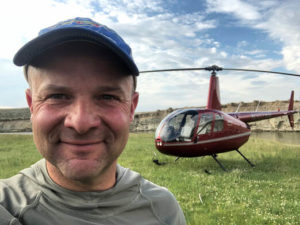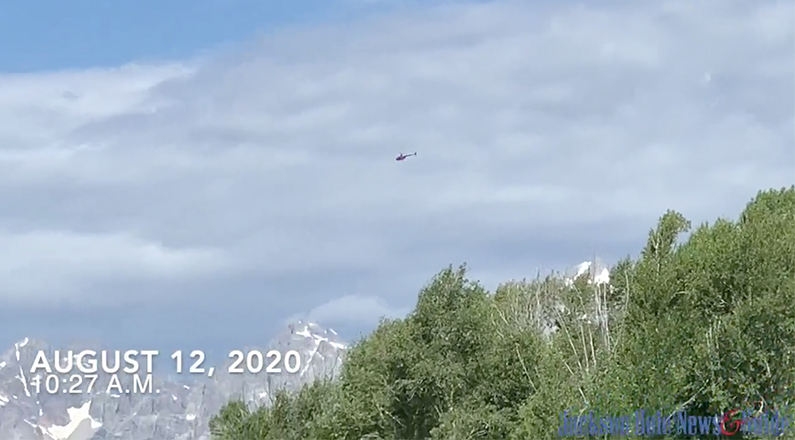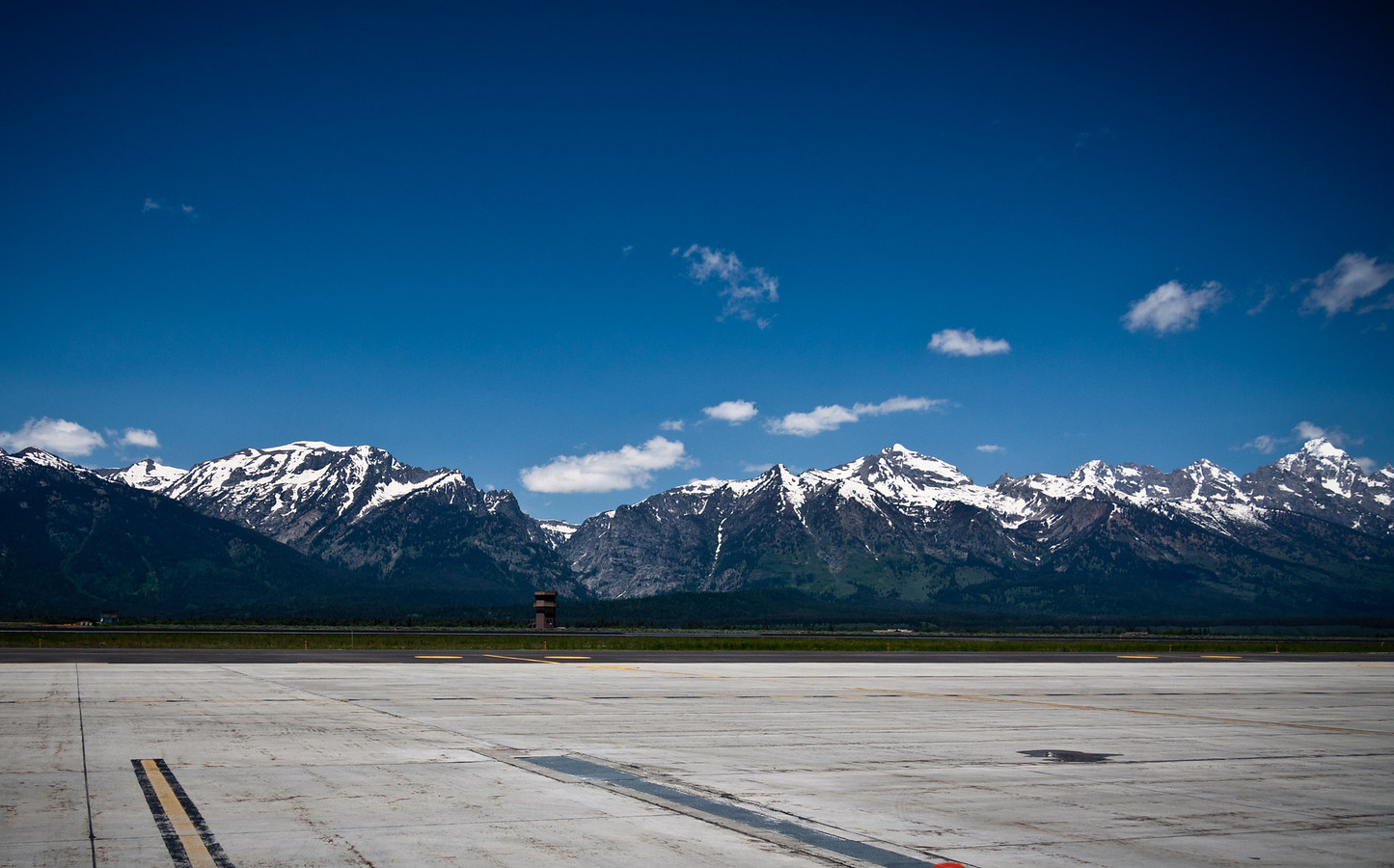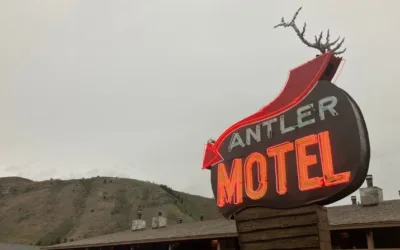The Jackson Town Council got at least 25 emails supporting a ban on commercial helicopter tours over Grand Teton National Park during the week leading up to their May 17 meeting, during which councilors unanimously adopted a resolution opposing the scenic flights. The messages came from a range of community stakeholders, including Jackson resident Mike Halloran.
“I think it’s absurd,” Halloran said. “I don’t know what planet the FAA lives on that it permits heli tours in a precious national park.”
Halloran’s comment cuts to the heart of the issue when it comes to commercial air tours over the park: Neither local government bodies nor the park itself has the authority to ban them. As per the National Parks Air Tour Management Act of 2000, commercial air tours are managed by the Federal Aviation Administration—the FAA. So, the town resolution, along with a nearly-identical one also unanimously passed by the Teton County Board of County Commissioners on April 20, is largely symbolic.
Jackson Town Councilor Jim Rooks asked Town Attorney Lea Colasuonno to clarify that during the recent meeting.
“This is more than symbolic. It expresses your, you know, community’s statement in terms of being the elected officials for the community about the air tour issue in the community and speaks directly to legislators and [tells them you’re] looking for some relief,” Colasuonno responded. “But you are correct that the ultimate power in terms of the contract and the requirements are under federal law.”

Tony Chambers is the founder and helicopter pilot of Wind River Air, LLC, the only company currently with a permit to operate scenic helicopter tours out of the Jackson Hole Airport. (Courtesy of Tony Chambers/Wind River Air)
At present, just one private company has a permit to operate scenic helicopter tours out of the Jackson Hole Airport. Wind River Air, LLC started operating its flights in June 2020.
Despite their lack of authority, town and county leaders said they’re opposed to the tours because of documented negative impacts like noise pollution, wildlife disturbances and potential safety hazards. Teton County Commissioner Luther Propst echoed the worries of many area residents when he said he’s concerned not just about one current operator but the bigger picture down the road.
“I’ve spent time in northwest Arizona, the Grand Canyon… I’ve spent time in Hawaii, on Kauai and Maui and Molokai, where the helicopter business has become a big industry,” Propst said. “And I’m concerned that if we can’t find a way to regulate or to prohibit helicopters over Grand Teton National Park and over the wild areas of the Bridger-Teton National Forest, that we’re going to wind up with another amusement park type activity that has impacts on wildlife and that has impacts on every other form of outdoor recreation.”
Tony Chambers, the founder and helicopter pilot of Wind River Air, which he started in 2018, sees things differently.
“I have a right to operate those tours or any other type of business that I operate as much as anybody else,” he said. “As much as the river rafters, as much as the wildlife tours and vans, as much as the coaches taking people up into Yellowstone, as the snowshoe guides, the mountain guides—I mean, all of the above.”
Chambers said scenic flights now make up about a third of his business and that he tries to concentrate the tours he operates from the Jackson Hole Airport to just a couple of days per week. Even so, Chambers’ red Robinson R-44 helicopter is becoming a familiar sight to area residents like Ryan Dorgan of Kelly, who captured multiple videos of a red helicopter flying over Grand Teton National Park between July and December 2020.

A red helicopter is seen flying over Grand Teton National Park in a screenshot of a video captured by Kelly resident Ryan Dorgan. (Courtesy of Ryan Dorgan/Jackson Hole News&Guide)
Asked to describe his typical clients for scenic flights, Chambers said his customers are a mix of visitors and locals.
“Contrary to popular belief, it’s not like the rich and famous that can afford to do these flights. It’s actually just normal people—kind of normal, everyday people that are on vacation—and it’s a bucket list item, something that they want to do. And they do it and they’re tickled pink.”
Chambers said he estimates that about 20% of his clients are locals. But there’s also plenty of local opposition to his business: As of Monday, 2,542 people have signed the Jackson Hole Conservation Alliance’s Heli-No Petition opposing the tours, according to the Alliance’s Conservation Program Manager Chelsea Carson. The goal of the campaign is to permanently ban heli tours over the park through congressional legislation.
“So, there’s a lot of steps involved,” Carson said, asked how optimistic she is about the odds of getting a bill through Congress. “I would say I’m very hopeful. And the fact that we have the town and county resolutions, the fact that we have really large community engagement and opposition on this issue, I think that we’re setting ourselves up really well. But—it’s just a little early to say how this is all going to play out.”
Too early, in part, because Chambers’ permit to continue operating scenic flights was just renewed for another year in April by the Jackson Hole Airport Board. But the board also chastised Chambers for what they said were clear departures from the flight paths he agreed to fly in and out of the airport, which is located in the park and the only part of the park Chambers is authorized to fly over. The board president, John Eastman, also cited alleged violations of Grand Teton’s request that he fly above 2,000 feet while in park airspace.
Bob McLaurin is the lone member of the airport board who voted against the permit extension.
“I voted against it because I looked at the flight tracks that had been flown,” McLaurin said, “and my understanding of that data that was presented by President Eastman—I didn’t feel I could vote for it because he hadn’t done what he said he was gonna do.”
Chambers said there’s no merit to the claims that he’s flying over the park more than necessary for his scenic tours. That’s because there are different rules for different kinds of flights.
“How can you or the airport board distinguish the different flights that I perform?” he asked. “How do you know it’s a scenic flight versus a ferry flight versus an instructional flight? You don’t.”
McLaurin said Chambers has a point there, but that there’s also some evidence the pilot’s behavior has improved since he was reprimanded by the board.
“My understanding is he’s not flying over the park nearly as much since we had that conversation at the airport board,” McLaurin said.
Chambers said he’s not interested in developing an Air Tour Management Plan with the FAA and the National Park Service, which would be required for him to fly over more of the park. However, the other federal lands his scenic tours fly over, he said, like the National Elk Refuge and parts of the Bridger-Teton, aren’t subject to that kind of protection.
“Over non-wilderness forest, there is no altitude requirements, no other—no other regulations, and that’s regulated by the FAA. It’s not regulated by the forest service.”
The FAA declined KHOL’s interview request for this story. The administration also declined to say how many noise or other complaints it’s gotten related to Wind River Air through the FAA hotline. The town maintains that there have been at least six violations reported over the park, which Chambers disputes. The Jackson Hole News&Guide also obtained correspondence from Grand Teton National Park Superintendent Chip Jenkins through a public records request in which he said the park and the airport have verified “numerous” violations over park airspace. The FAA responded that it found insufficient evidence to penalize Chambers and that it considers the matter closed.
“My record with the FAA is squeaky clean. Zero violations on any kind of level. Any kind of activity,” Chambers said. “And my safety record is squeaky clean with no incidents, no accidents, no—no nothing.”
The FAA has also told the airport board that revoking or denying a renewal permit for Chambers would automatically trigger an investigation. That could potentially jeopardize about $132 million in FAA funding for the airport, according to the News&Guide.
In short, local residents like Halloran could be left frustrated for a while—but that doesn’t mean they might not try to take matters into their own hands.
“I would say that there are citizens in Jackson who have sufficient money to do this and are considering litigation against them [Wind River Air] as we speak,” Halloran said. He also confirmed to KHOL that he is among the residents considering such a lawsuit.
Another outcome short of federal legislation that the Conservation Alliance is hoping might be a possibility is that Chambers will voluntarily stop his scenic flights in the face of vocal community opposition. He said that’s not likely.
“I live here. I operate here. Business is just fine,” the pilot said. “There’s no reason whatsoever for me to want to walk away.”






